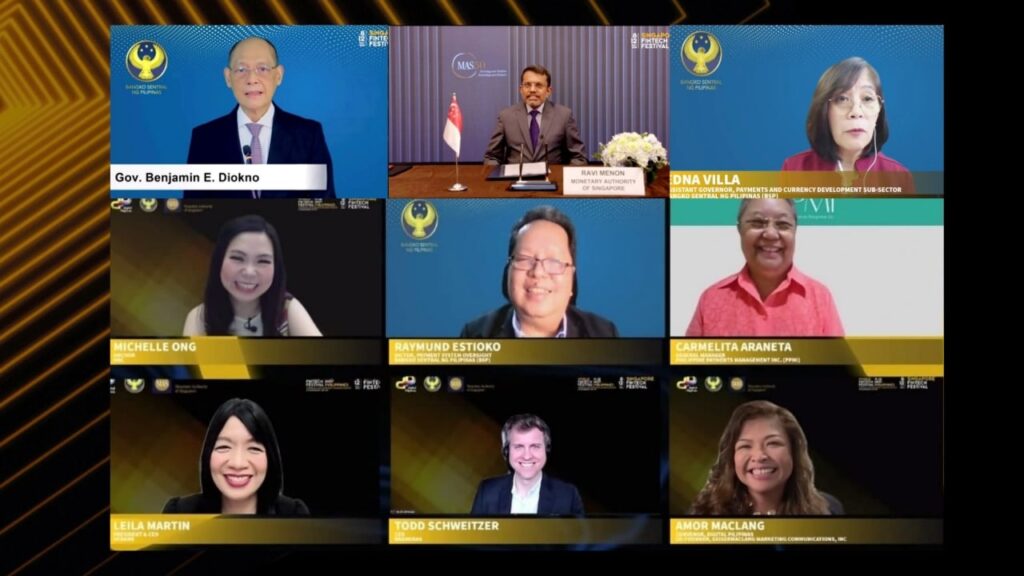The Philippines and Singapore deepened their fintech-based relationship with various cross-border collaborations that will strengthen ASEAN regional payments and provide financial inclusivity to Overseas Filipino Workers (OFWs) and micro-small-to-medium-sized enterprises (MSMEs).
During the recent World Fintech Festival Philippines (WFF) 2021 – Singapore Fintech Festival (SFF), Bangko Sentral ng Pilipinas (BSP) Governor Benjamin Diokno and Monetary Authority of Singapore (MAS) Managing Director Ravi Menon signed the expanded Fintech Innovation Function Cooperation Agreement.
One highlight was the linkage of the two countries’ QR and real-time payment systems. In his statement following the signing ceremony, Gov. Diokno said that “the BSP is taking the initial step in linking the Philippine payment system with those of our ASEAN neighbors, beginning with Singapore.”

He added that the agreement will enhance safe, efficient cross-border payments through smoother and seamless international fund transfers. Managing Director Menon called it “a concrete step towards the vision of an ASEAN network of interconnected real-time payment systems.”
MAS’ launch of regional tech platforms strengthens the growth of ASEAN cross-border transactions: Proxtera, which enables seamless trading for SMEs; the non-profit open-architecture API Exchange (APIX) which supports ASEAN and global financial innovation and inclusion; and Oxygen, APIX’s knowledge-upskilling platform that provides masterclasses from industry experts.
SFF 2021’s discussions are shaped by new changemakers as well as central banks’ impact-makers, policymakers, and financial gurus. MAS Chief Fintech Officer Sopnendu Mohanty gave one advantage of this approach for MSMEs: “We are democratizing the unique and valuable content into a signature knowledge certification programme and a special SME day with an upskilling programme.”
Amor Maclang, Digital Pilipinas Convenor, expressed support for the enhanced BSP-MAS Cooperation Agreement through “the whole-of-society approach in solving today’s and tomorrow’s technological needs.” Digital Pilipinas, which helped launch WFF 2021 with the MAS, will “continue to be at the service of both the BSP and MAS as this agreement is a very important pillar in tech-ing up our country,” said Maclang.
Tech education and certification
Digital Pilipinas is a national movement that solves Philippine industry-wide challenges through digitalization, tech education with certification, and the creation of industry sandboxes. With the support of the Department of Trade and Industry, its program Business Without Borders and its partnership with Proxtera will connect SMEs with the greater ASEAN network. The upcoming Digital Pilipinas Academy will hold educational micro-certification courses on the blockchain; its academic program, the Incremental Industry-Driven Technology Education Resources Authentication Testing Ecosystem (I-ITERATE), will feature courses on Open Finance, Fintech, and other nascent technologies.
With the BSP and MAS models serving as their guide, the sandboxes that Digital Pilipinas will develop with national line agencies can accelerate innovation in alignment with regulatory policies. Digital Pilipinas’ partners in this initiative are Proxtera, APIX, and Oxygen.
Safe, secure, and swift digital payments
Through Business Without Borders, Digital Pilipinas will operationalize plans for tech-ing up entrepreneurs and connect MSMEs with international trade. Its opening up of the ASEAN market to local companies through digital gateways is in alignment with the BSP-MAS’ updated Cooperation Agreement.
Built on an earlier 2017 agreement between the BSP and the MAS, the updated Cooperation Agreement will also provide opportunities to the tourism, payments, and cybersecurity sectors. Raymond Estioko, BSP Director for Payments System Oversight, said that the 2021 agreement will make cross-border payments “cheaper, more inclusive, and more transparent.”
BSP Assistant Governor Edna Villa named another new development: “Collaboration specifically on payments innovation and the linking of the two payment systems of the Philippines’ InstaPay and Singapore’s PayNow.”
Brankas CEO Todd Schweitzer described how the alignment of financial access and tech education can improve the lives of underserved Filipinos: “Allowing them to connect to the new payment systems can help drive financial inclusion. This can be beneficial to OFWs in their decisions about which insurance product fits their needs.”
Carmelita Araneta, General Manager of Philippine Payments Management Inc. (PPMI), acknowledged that economic and tech “power is starting to move in Asia.” Their P2M (Person-to-Merchant) system is designed to connect with Singapore-based OFWs who are Instapayusers.
Meanwhile, Leila Martin, President and CEO of OFBank, acknowledged that through the new BSP-MAS digital payment network, OFWs “can look forward to a strong, enabling environment that will ensure that cross-border payments are safe and devoid of fraud.” The BSP-MAS extended Cooperation Agreement and the new Digital Pilipinas partnerships are expected to trigger more collaborations across the ASEAN. As Maclang put it, “They will help speed up cross-border financial transactions between the Philippines and Singapore, and move Philippine industries forward towards economic integration among the ASEAN.”

